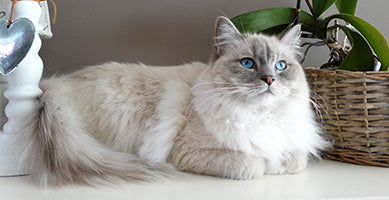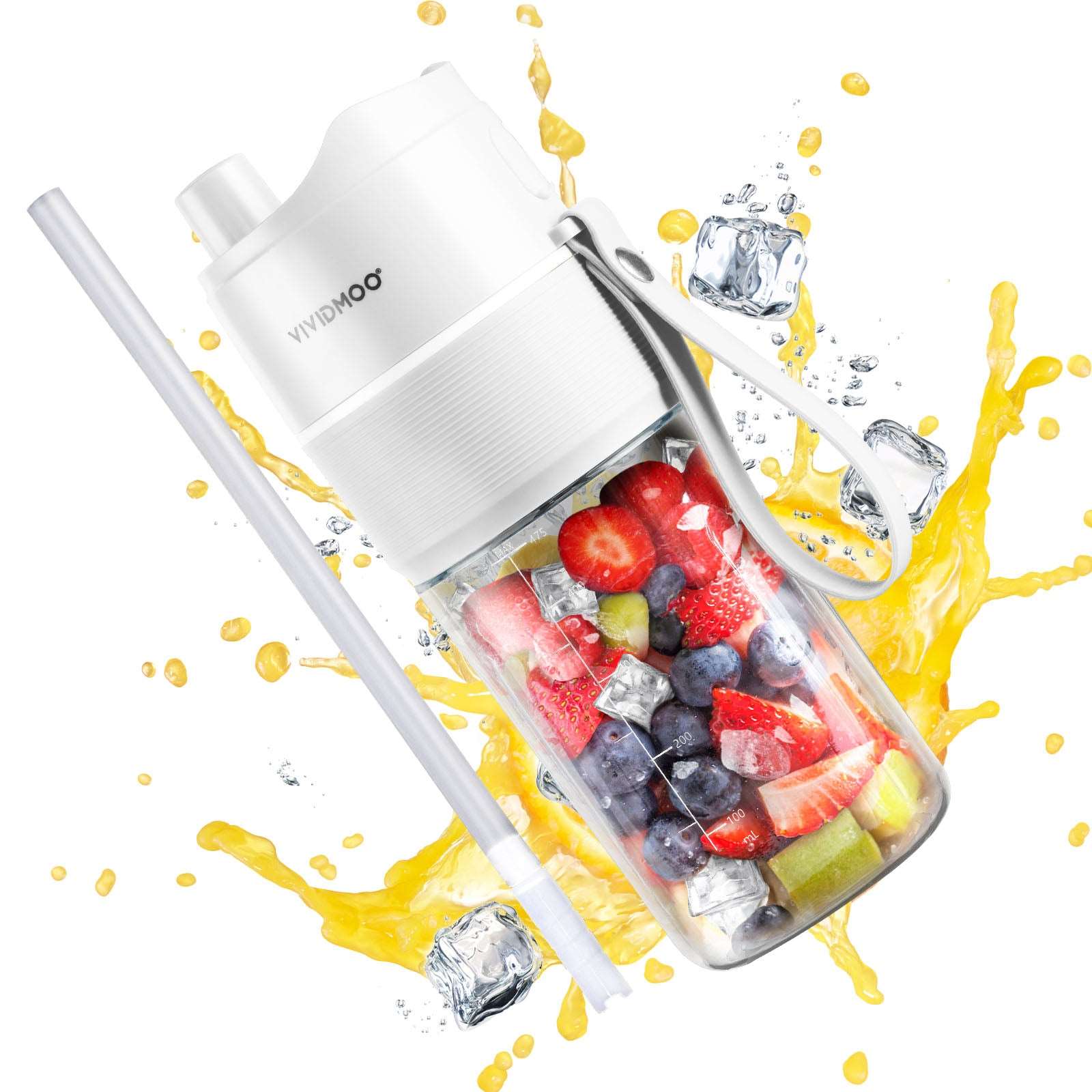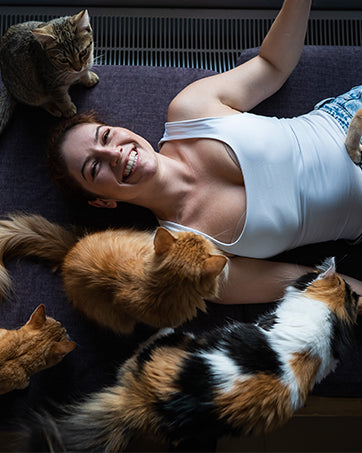Jessica W. Kelvin - Mar.05.2024
Why Do Cats Eat Grass?
7 Insights into Feline Behavior

Can Cats Eat Peanut Butter?
Est. read time: 4 min.
MMany of us (and our dogs) can’t get enough of the gooey, sticky, delicious spread, peanut butter. But maybe you’ve noticed another furry family member sniffing around your PB&J. Can cats eat peanut butter? We’ll take a look at why your cat probably shouldn’t indulge. Can c
Can cats eat peanut butter?
The simple answer is yes, cats can eat peanut butter—but it’s typically not recommended because it’s not beneficial nor is worth the risk. The ASPCA does not list peanut butter as toxic to cats. However, peanut butter doesn’t have much nutritional value for cats—plus it can lead to obesity and other negative side effects if consumed too frequently.
Cats don’t need peanut butter
If you’re a peanut butter lover, you’re probably well aware that the spread is high in fats, protein, and carbs, along with salt and even sugar. Your cat doesn’t really need any of these ingredients. Sure, they require a diet that is high in protein and some fats, but they are obligate carnivores, meaning they need animal-based protein and fats.
So when, if ever, can cats eat peanut butter? A taste of peanut butter here and there probably isn’t going to make your cat sick or lead to obesity. For instance, if you have to give your cat medication, you might consider using peanut butter for the old conceal-a-pill trick.

Too much peanut butter can make your cat sick
Like any food rich in unnecessary nutrients for the feline diet, there is the potential for cats to get sick from eating too much peanut butter. Although it’s unlikely your cat will have an allergic reaction to peanut butter as some humans do, they can be allergic and react, so it’s good to be aware of what negative reactions might look like. These include:
-Gastrointestinal symptoms like vomiting, diarrhea, or gas
-Difficulty breathing
-Hives
-Itching
-Swelling
-Fever
-Lethargy
-Some peanut butters include added chemicals that may be toxic to your feline friend. An example of this is xylitol, which has been historically used in peanut butter as a sweetener. While this toxicity is much better described in dogs and can cause fatal liver damage, it is suspected that a similar process occurs in cats and it is safer to avoid ingestion.
-If you notice your cat experiencing any serious allergic reactions or vague symptoms, get to a vet right away for medical treatment.
Cats:Theobromine Toxic Consumption
Most Cats: 1-10 lbs(0.45-4.6 kg), Large Cats11-25 lbs(5-11.4 kg)
Cacao Beans: Most Cats> 0.05 oz, Large Cats> 0.5 0z
Unsweetened Baking Chocolate: Most Cats> 0.2 oz, Large Cats>2 0z
Dark Chocolate: Most Cats> 0.5 0z, Large Cats>7 oz
Milk Chocolate: Most Cats>1.5 0z, Large Cats>16.5 0Z
White Chocolate: Most Cats>360 oz, Large Cats>4000 0z
Cocoa Powder: Most Cats> 01 0z, Large Cats>10z
Cocoa Bean Mulch: Most Cats>0.1 0z, Large Cats>1 0z
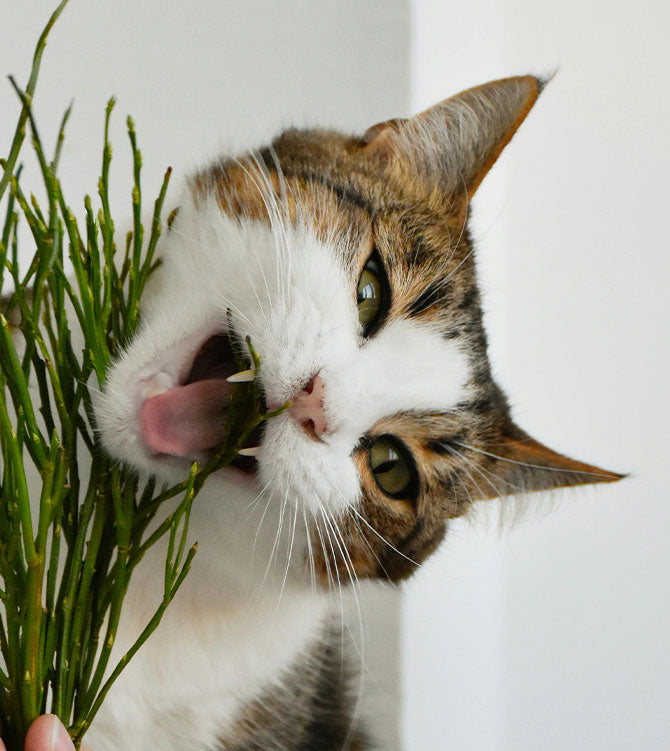
Showing making procedure is a good way to guarantee product quality
Stress Relief
Eating grass can also serve as a form of stress relief for cats, providing a calming activity that distracts from anxiety or boredom.
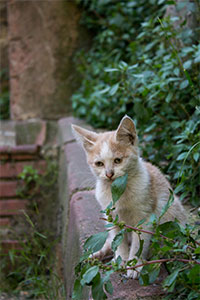
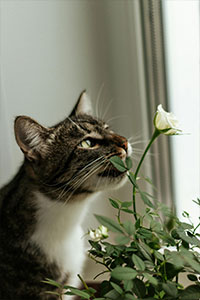
Get customer attention by clean visual and video
Instinctual Actions
Grass eating is an instinctual behavior that may stem from a cat's need to seek out alternative food sources or to induce vomiting to clear their stomachs of indigestible materials.
Beware peanut butter in pest control products
This goes for dog and cat parents alike: Some pest control products incorporate peanut butter flavors as a form of bait. For instance, a popular rodenticide bait comes in specially formulated blocks that have a peanut butter flavor to attract and eliminate mice and rats.
Article credit: Heidi Cohen (https://heidicohen.com/use-blog-to-sell/)
Digestive Aid
Grass acts as a natural laxative, helping cats pass hairballs or other indigestible items through their digestive tract more easily.
Elimination of Parasites
It's also theorized that grass eating may help cats eliminate intestinal parasites, although this benefit is more anecdotal than scientifically proven.
Can cats eat peanuts?
We’ve established that peanut butter doesn’t provide your cat with any nutritional value. What about peanuts? Unsurprisingly, the nutritional value of peanuts is also of little benefit to your cat. Again, peanuts tend to be high in protein and fats, but not the kind your cat requires.
Furthermore, peanuts may pose a choking hazard for your cat. If you do want to allow your cat a peanut snack, make sure the peanuts are unshelled, diced or chopped small, unsalted, and sugar-free. Last but not least, make sure to supervise while your cat eats peanuts.
Now you know that while cats can eat peanut butter, they shouldn’t eat much of it.
Sources:
-Xylitol Toxicosis in Cats
How to Safely Introduce Grass to Your Cat
Suitable Types of Grass
Certain types of grass are more beneficial and safer for cats, including wheatgrass, which is often sold as "cat grass."
Growing Your Own Cat
Grass
For the safety and health of your cat, consider growing your own cat grass at home. It's a simple and effective way to ensure they're getting a safe product.
Alternative Behaviors and Solutions
Dietary Supplements
If your cat shows an excessive interest in eating grass, it might indicate a dietary deficiency. Consult with a veterinarian about supplementing your cat's diet.
Behavioral Enrichment
Providing toys, climbing structures, and engaging activities can reduce your cat's inclination to eat grass by offering alternative forms of stimulation.
Why Do Cats Eat Grass?
Exploring the curiosity behind this behavior reveals a complex blend of nutritional, psychological, and instinctual factors. Understanding these can help cat owners provide better care and enrichment for their feline friends.
Owner Experiences and Advice
Personal Anecdotes
Many cat owners have observed their pets eating grass and have noted the benefits or concerns that came with it. Sharing these experiences can offer valuable insights for other pet owners.
Expert Recommendations
Veterinarians and animal behaviorists can provide professional advice on managing grass-eating behavior, ensuring it remains a safe and positive experience for your cat.
FAQs
Cats should not eat chocolate ice cream; not only is chocolate toxic to cats, but ice cream often contains toxic ingredient propylene glycol. Ingesting propylene glycol can lead to anemia in cats.
Say it at the end
Understanding why cats eat grass sheds light on their complex behaviors and the natural instincts that drive them. By providing safe, suitable grass and paying attention to the underlying reasons for this behavior, cat owners can ensure their feline companions lead happy, healthy lives.



